A key Japanese advocate for human rights in China – and leader in calling for a boycott of the 2022 Beijing Winter Olympics – told Breitbart News this week that, in addition to governments and Olympic sponsors, high-profile Japanese athletes should use their platforms to denounce the ongoing genocide of ethnic minorities in the country.
Hidetoshi Ishii, the vice president of the Free Indo-Pacific Alliance, is leading a campaign in Japan urging the Diet, the national lawmaking body, to condemn China for its human rights abuses, and in some cases genocide, of ethnic minorities and political dissidents in multiple territories, including Xinjiang, Tibet, Hong Kong, and Southern Mongolia, among other places. A public acknowledgment of the severity of crimes, Ishii hopes, will raise serious questions about what message Japan would be sending the world by participating in the Olympic Games.
“The sentences of the National Diet resolution condemn the human rights oppression that is being done in Uyghur [East Turkistan], Tibet, Southern Mongolia, Hong Kong and Myanmar,” Ishii told Breitbart News. “The Japanese government has never condemned these; what they have said so far is only that they’re concerned.”
“There’s no mention of the Beijing Olympics in the sentences. However, if this National Diet resolution gets approved, then the Beijing Olympics will be a huge topic as the next step,” Ishii explained. “A National Diet resolution carries great significance in Japanese politics. If the National Diet resolution acknowledges the human rights issues in China, the Japanese government is going to have to take actions based on that accordingly.”
The Diet has yet to succeed in passing the resolution, in part due to resistance from pro-China politicians and inhibitions others have about potential criticism of the Tokyo Summer Games, Ishii said.
“It’s not only the government, but also, the majority of the politicians in Japan, especially the National Diet members of the ruling parties [who] are silent on the Beijing Olympics,” Ishii told Breitbart News. “That is because they’ve been afraid that if Japanese politicians criticized the Beijing Olympics, China would criticize the Tokyo Olympics … In my opinion, those politicians are such cowards, but unfortunately, that is the reality.”
The Chinese coronavirus pandemic and concerns about community spread made the Tokyo Olympics particularly unpopular among the Japanese population, national polls indicated.
Outside of the directly political sphere, Ishii lamented that the campaign against participating in the Beijing Olympics had “not at all” received support from powerful corporate sponsors, big-name athletes, or other private actors who could help pressure the government. He nonetheless emphasized the importance of these actors to take a stand for the rights of those persecuted by the Communist Party. Ishii named two Japanese athletes in particular who have a megaphone large enough to make a difference: tennis champion Naomi Osaka, currently in New York playing the prestigious U.S. Open, and runner Dai Tamesue, a record-holder in Japan for the 400-meter hurdle track event.
“I think that the professional tennis player Naomi Osaka and the former track and field athlete Dai Tamesue, the two of them should give some commentary on what they think about the Beijing Olympics,” Ishii told Breitbart News. “Naomi Osaka agrees with BLM [Black Lives Matter] and she has tried to boycott her games before. Also, she criticized Yoshiro Mori, the former Tokyo Games chief, as sexist.”
Osaka has been a vocal supporter of the Black Lives Matter movement and recently reinvented herself as a spokesperson for mental health awareness – a move that has garnered her praise from international establishment media even as she boycotted press conferences and accused journalists of assaulting her own mental health.
Mori lost his job as the head of the committee running the 2020 Tokyo Summer Olympics this year after reportedly complaining that women talk too much in meetings. Osaka condemned the comments as “really ignorant,” but has at press time remained silent on the forced sterilization of thousands, if not millions, of Muslim women in China.
Osaka went on to light the Olympic Cauldron for the Tokyo Games.
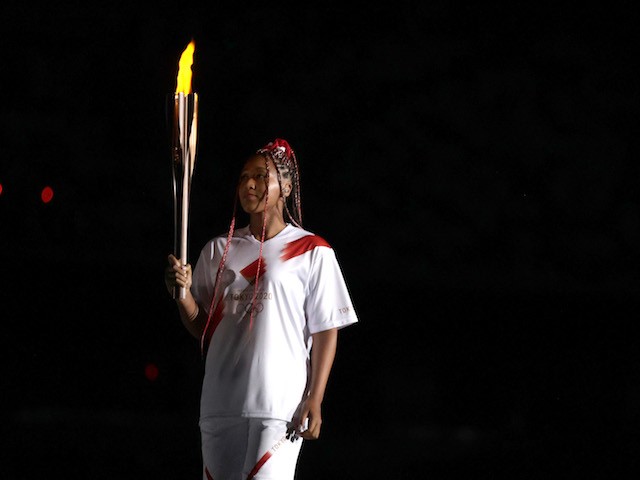
Naomi Osaka of Team Japan carries the Olympic torch towards the Olympic cauldron during the Opening Ceremony of the Tokyo 2020 Olympic Games at Olympic Stadium on July 23, 2021, in Tokyo, Japan. (Photo by Hannah McKay – Pool/Getty Images)
“She has made comments publicly on human rights issues and political matters. And if she is silent on issues like Uyghur and Hong Kong regardless, then that’s double standards,” Ishii asserted.
As for Dai, Ishii noted that the track athlete also condemned Mori but added disapproval for anyone refusing to publicly speak out against his remarks.
“When it happened [Mori’s scandal], he [Dai] said ‘silence means consent,’ and this claim became famous in Japan. Therefore, he should speak on what’s happening in Uyghur [East Turkistan], Hong Kong. If he doesn’t speak on the Beijing Olympics, then he will be criticized for approving the Uyghur genocide.”
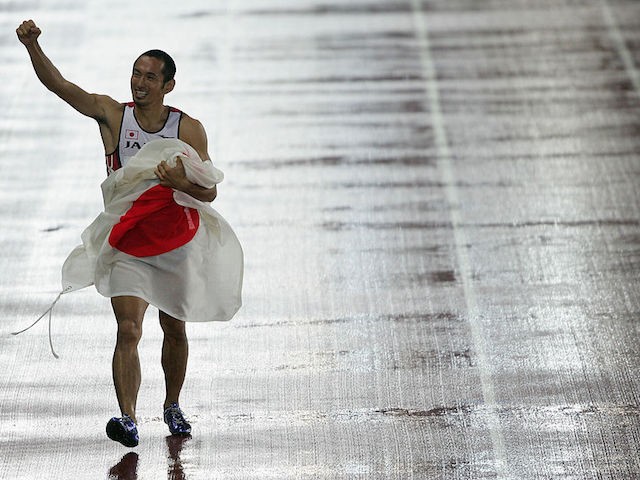
Dai Tamesue of Japan celebrates his bronze medal in the men’s 400 metres hurdles final at the 10th IAAF World Athletics Championships on August 9, 2005 in Helsinki, Finland. (Photo by Stu Forster/Getty Images)
In addition to athletes, the corporate sponsors of the Beijing Olympics have a responsibility to condemn China and back out of the event, Ishii said, adding that the coalition calling for a boycott intends on appealing to the companies to reconsider, particularly prominent sponsors like Toyota and Panasonic.
Among other international brands backing China in the Olympics are Coca-Cola, Proctor & Gamble, and the credit card giant Visa. While much of the pressure has so far landed on governments not to send athletes to the Games, the U.S. Congress acted in July, bringing in representatives of five corporate sponsors of the Games to explain their participation in the Olympics and their stances on genocide. Of the five, the representative of only one company, Intel, agreed with the U.S. government assessment that China’s actions against the Uyghur population of East Turkistan fits the legal definition of genocide.
The other corporate representatives emphasized that they do not participate in the host selection process, only the IOC makes that decision.
“We support and follow the athletes wherever they compete,” Coca-Cola’s global vice president for human rights, Paul Lalli, told Congress – a remark suggesting that perhaps athlete advocacy for holding China accountable for its human rights abuses would prompt “support” from Coca-Cola’s human rights division, which the soft drink company apparently has.
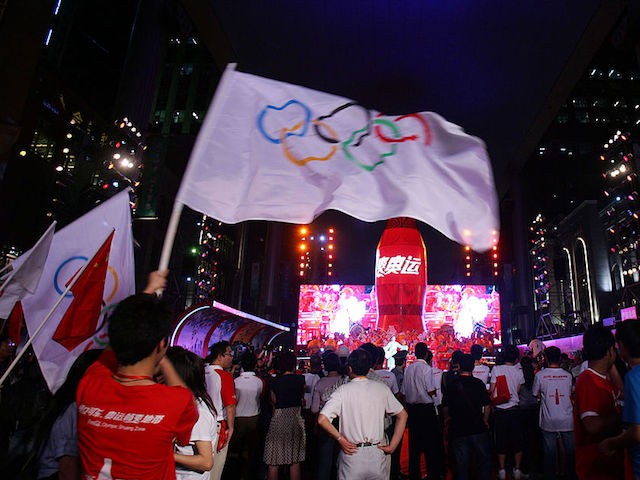
Spectators watch a performance in front of a light decoration featuring a huge Coca-Cola bottle at the Coca-Cola exhibit area at a square on August 1, 2008 in Beijing, China. (Photo by China Photos/Getty Images)
The Free Indo-Pacific Alliance that Ishii helps lead is a multi-ethnic coalition that advocates for containing the global threat that the Chinese Communist Party presents to the free world, and particularly to Chinese people under its repressive rule.
In February, the Free Indo-Pacific Alliance joined over 150 human rights organizations calling for a worldwide boycott of the Beijing 2022 Olympic Games. The group argued that participation in the Olympics doubled as an endorsement of the Communist Party’s political behavior at a time in which it is believed to be in control of the world’s largest concentration camp system and is brazenly conducting genocidal activities such as forced abortions and sterilizations of minorities; widespread torture and gang rape, disappearances, slavery, indoctrination, and live organ harvesting.
An open letter the 150 groups published at the time noted that China’s human rights abuses “increased substantially without rebuke” after the International Olympic Committee (IOC) awarded it the honor of hosting the 2022 Winter Olympics.
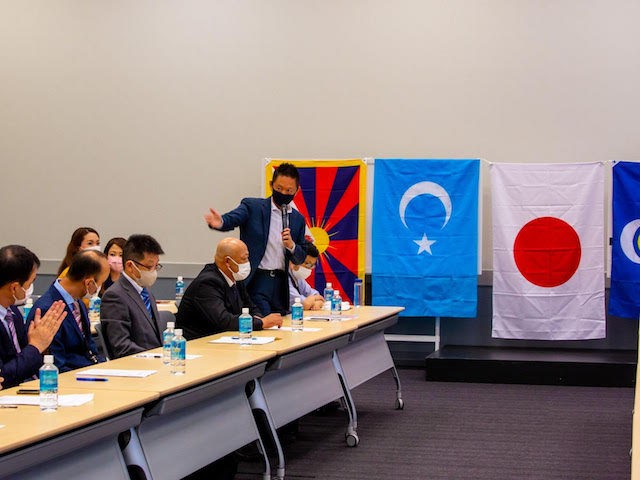
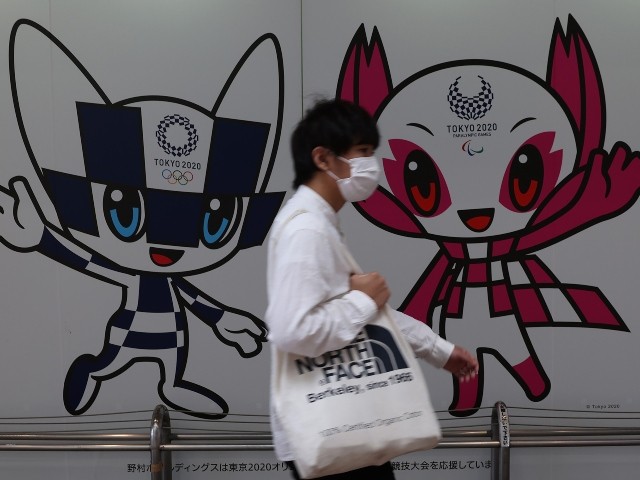
COMMENTS
Please let us know if you're having issues with commenting.